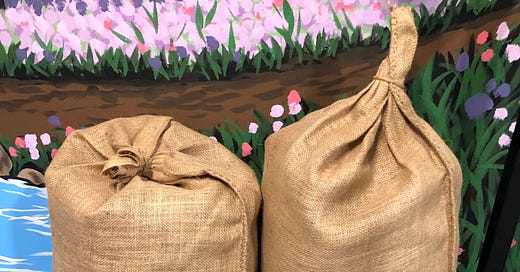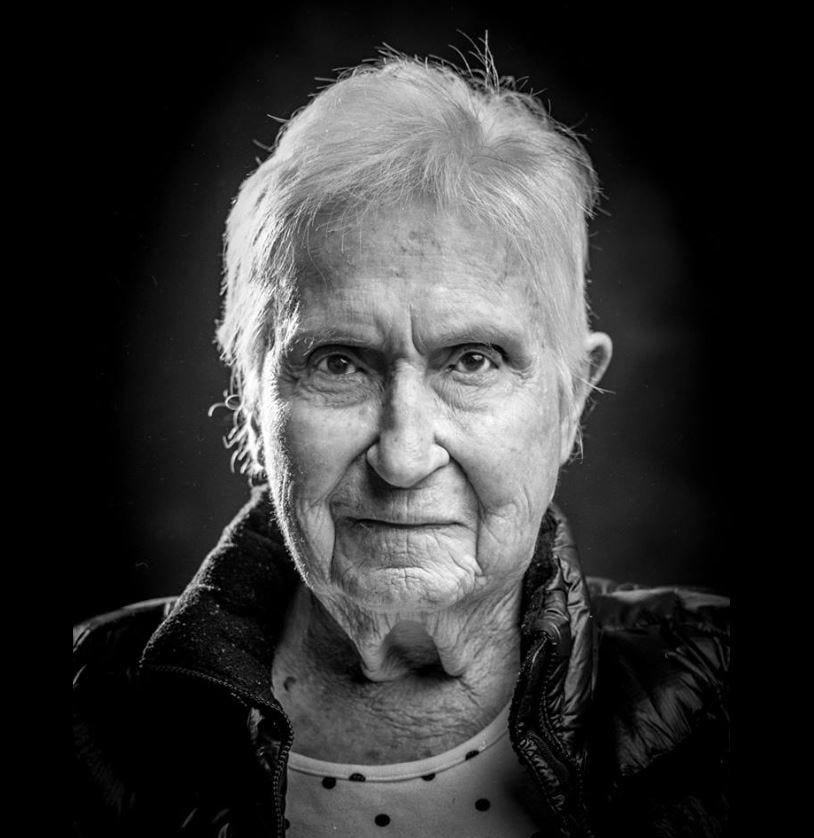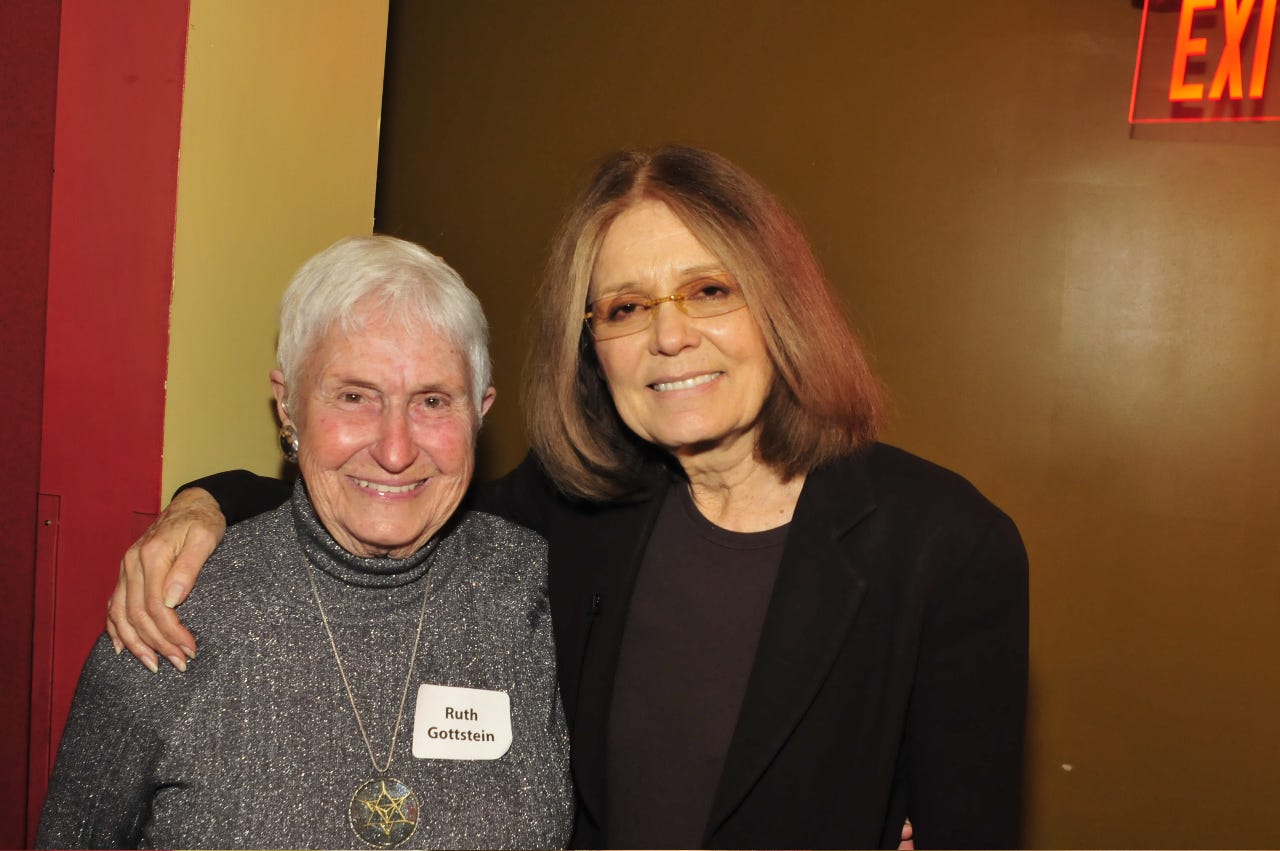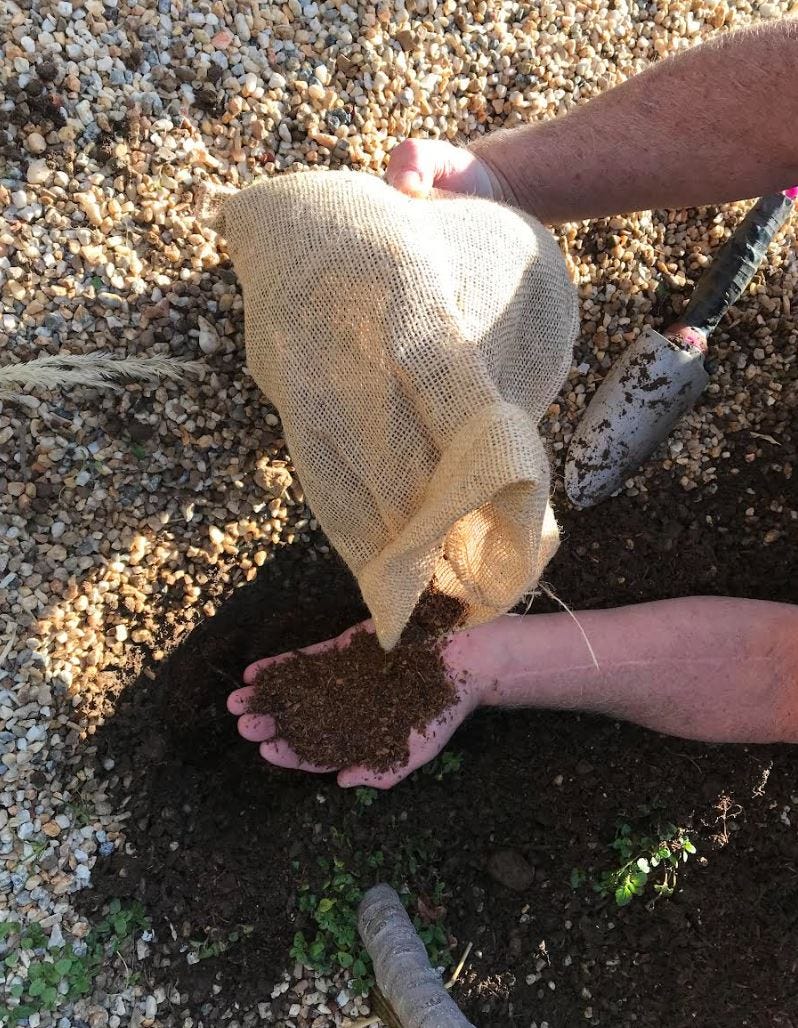Opening A Human Composting Funeral Home Included a Few Surprises
An Investment Banker Digs Into the Death Industry
Happy New Year, and welcome to Wells $treet! This newsletter focuses on money, which means it focuses on everything, because behind every headline is someone handling the cash.
I especially like pursuing strange tales about unusual businesses created by even more unusual entrepreneurs, which is why I recently visited a funeral home in Seattle.
It may seem odd to start the new year with a story about death, but why not? We’re busy making resolutions to lose weight, save money, live better. Maybe we should also think about what happens when we have no more diems to carpe.
Plus, historically, a lotta people die over the holidays, so it seems timely.
But this is NOT a depressing story. Instead, it’s a crazy saga about a guy who aspires to change the world and make a fortune at the same time. He’s chosen the death biz, and I, well, live for this.
A Steep Learning Curve
“Okay, let’s try it again.”
Micah Truman needs to stop for a minute. I’ve caught him off guard.
Micah is the founder and CEO of Return Home, probably the most famous “human composting” funeral home in the world. (It’s a pretty small club.)
You might’ve read about composting as the latest and purest form of “green burial.” Micah was most likely in that story.
What you haven’t read is what it’s really like to start a funeral business from nothing, with no experience.
Micah needs to stop and gather himself as we stand inside Return Home’s large, warehouse-like facility. It’s filled with about 150 covered containers used during various segments of the so-called “terramation” process. About 25% of them are currently composting humans, turning them into a nitrogen-rich soil.
There’s no odor (except for maybe the smell of dirt?), but what surprises me is that some of the composting “vessels” are covered with photographs of the loved ones inside. There are chairs nearby, where family members sit and visit during the 60-to-90-day process.
Micah looks younger than his 50 years. He’s a man full of energy, perpetually perky, smart, and hilarious. He’s been interviewed a lot, and he has his message down: Green burials are the future, people will want terramation once they understand it, and this is good for the planet.
But when I ask him if there’s a particular “client” that sticks in his mind, he pauses. He begins to tell me about a little boy who died and whose mother had him brought to Seattle from Georgia.
“When he came, he had his stuffed animals with him,” Micah tells me. “And when it came time to put him in the vessel, I realized that our…”
This is when he pauses. His emotions threaten to get the better of him, so I wait.
“We couldn’t pick him up in the normal way we would somebody else,” he finally continues. “So I had to do it with my arms.”
That was not something Micah expected when he opened a funeral home. It would not be the last thing to surprise him.
How Did Micah End Up Here?
Micah Truman was born in New York. He spent a decade living in Kenya as the son of a U.N. diplomat, John Truman. The family moved to Seattle when Micah was in high school. After he graduated college (Oberlin), he moved to China, where he lived for 20 years working in various fields — English teacher, women’s lingerie, internet advertising. Finally, “I opened an investment company that raised capital in China and deployed it in the United States to large real estate projects.” He was very successful. “I’ve flown a million miles on Delta.”
In 2014, Micah — now married — moved back to Seattle, and he felt restless. “My obsession became, ‘How do we make a company that, honest to God, the bigger it gets, the better off the world is for it?’”
Micah wanted to do something green, but what? He tells me that most environmental companies fall into one of two categories. Either they’re unsustainable (pun!) — like producing sustainable toilet paper in remote villages that costs $14 a roll but only 20 rolls can be manufactured per month. The other category of green is companies lying about making the planet better — like buying carbon credits off someone who has too many credits and never intended to produce that much carbon in the first place (Don’t. Get. Me. Started.).
Micah wanted the Holy Grail: something truly environmental and fabulously profitable. Green that makes green.
In 2018, the state of Washington became the first place to legalize human composting. “Oh my God, this is bananas,” Micah thought when he read the news. But the business fit his dream. It was green and scalable. “People die, all of us,” he reasoned. “We don’t need to take a survey.”
How hard could it be to compost bodies?
Wait, How Does Terramation Work?
Before we get back to the story, let’s briefly explain the composting process.
“The microbes in our body, the things that digest the food we eat, are hardwired to transform us back to the earth,” Micah explains. At Return Home, a body is placed inside a container and surrounded by a lot of alfalfa straw and sawdust — two parts organic material to one part human. This helps the body naturally heat up to nearly 170 degrees. The container is closed, and Micah pipes in a “trickle of air” to keep the contents from overheating.
After 30(ish) days, what’s left inside the vessel is a moist soil, plus bones, teeth and implants. Micah says the process can sometimes take a few weeks longer, especially if a person is lean (it’s a microbe thing… who knew?). Implants are then removed, and the bones and teeth are ground into shards to be put back into the soil and moved toward the back of the facility for another month.
What you’re left with after all of that is about 250 pounds of dirt. “The microbes eat the bones,” he says. When I ask if anything goes down the drain, he answers, “Nothing…not even water.”
Note: I was not allowed a peek inside a “vessel” in the front of the facility where the first part of the decomposition/composting takes place, but I did see inside one in the back. The consistency reminded me of a big bag of mulch from the nursery. Also, I saw a few bins in the front decorated with photos of loved ones, but the only one I was allowed to videotape was a mock-up, in order to protect the privacy of clients.
Compost from about 5% of Return Home’s clients is tested for contaminants like fecal coliform. So far, Micah says the results have come back clean. He also says terramation is a lot greener than cremation, because burning a body “takes 30 gallons of fuel and loads 540 pounds of CO2 into the air.”
Families receive up to 10 bags of compost when the process is completed, but not everyone wants the whole thing. For those who decide to leave some compost behind, they must agree for it to be commingled with other remains on an 8-acre parcel of woodland Micah bought for this purpose. “It’s a cool place,” he says. “It’s beautiful.” (He took me there. It is.)
The cost for a green burial at Return Home is $4,950, and that includes free pickup if a body is within 75 miles.
The service is free if the deceased is a child.
Back to the Story: How Micah Started the Business
Micah and his wife used their own money in January 2019 to hire people to design and fabricate the necessary machinery for human composting, including a proprietary device that turns the containers over to rotate the materials inside. A veteran of raising capital from his days in China, Micah eventually convinced a few investors to join him. Altogether, he says he’s raised more than $3 million.
He hired scientists just over the border in Canada to research human composting, but the border shut down during Covid. That led to delays. “They might as well have been in Zanzibar,” Micah says.
Micah’s team used dead pigs to figure out the best way to speed up the decomposition process and keep the microbes happy — learning how much organic material to add and what the proper amount of air circulation should be. “Your microbes better be working hard,” he tells me, “and if not, it’s a bad day at the office.”
Then there was the bureaucracy of setting up a new business in a new industry in the first state to allow it. “There’s a lot of licenses.”
After two and a half years, Return Home finally opened its doors for business in June, 2021.
Then came the surprises.
Surprise #1: Families Want to Visit and be Involved
The biggest shock for Micah and his team was the desire by some families to participate in the preparation of a loved one. Some even want to wash the deceased’s hair.
“I know that the moment we talk about this, someone goes, ‘That’s cuckoo bird, that’s really weird,’” he says. The old Micah would agree. Not now. “If you really think about it, if you really lose your person, don’t you want to sit with him? Don’t you want to say goodbye to him? Don’t you want to care for him?”
He says the funeral industry has kept families separated from the act of burial for so long, “We don’t even have the language to talk about what we want.”
Many families also want to visit during the terramation process, so Micah redesigned and decorated part of the warehouse to accommodate them. “Families were piling in,” he says. “I had no idea.”
Surprise #2: Many Clients are Young
“Two of our first five people who came to us were under 35 years old,” Micah tells me. “That was very powerful, and we continue to have a lot of young people.” He believes it’s partly because Millennials and Gen Z are more serious about going green.
Surprise #3: Clients Come from All Regions and Religions
“We’re taking in everybody,” Micah says. Families cut across socio-economic lines and religious beliefs, bringing their deceased loved ones from as far away as Hawaii and Connecticut. “We’ve really leaned on a network of Jewish funeral homes who are really good at unembalmed bodies being transported across the country,” Micah tells me.
Surprise #4: Different Sizes Require Different Processing
“Some humans are 80 pounds and some humans are 400 pounds,” Micah says. “We have to account for that and be able to adjust and allow the process to run.”
Surprise #5: The Artistry of Scars
Handling bodies has exposed Micah to the scars they bear, and what he sees astonishes him. “I always thought there was a standard way that [surgeons] did things,” he tells me. “And then you would find a body, and they had done this gorgeous, helixed, wire latticework up the side of somebody’s spine. You look at that and go, ‘Holy freaking cow, you’re an artist!’”
Surprise #6: Ritual is Important
Often the family is not present during the preparation of a body, and so it has become important for Micah and his staff to perform a sort of ritual.
Micah points to a gong he purchased. “Every time we place a person in a vessel and the lid closes, the only thing that I ask is that the person’s name be spoken, the gong be hit, and we wish that person a safe journey.”
This is not something he planned for when he started Return Home, but this ritual has proven to be very meaningful. “You can’t help but remember that you’ve got somebody’s person there, and that’s very important, because otherwise we’re just a process, and that’s unacceptable.”
Who’s Been Composted? Meet Ruth
Ruth Gottstein passed away on August 30th at the age of 100. “She lived her life very close to her core values,” says her son, Adam. Ruth was a veteran activist in Northern California, “from the civil rights movement in the ‘60s, the gay rights movement in the ‘80s, [and] she published the very first book on the subject of domestic violence in the United States.” (Ruth owned a publishing company called Volcano Press.)
Here she is in 2012 on PBS’ “News Hour” trying to save her father’s murals in San Francisco’s Coit Tower.
Ruth planned to be cremated, but about a year before her death, Adam discovered terramation. “I said to her, ‘What do you think?’” Adam says his mother smiled and replied, “Adam, of course. If it makes sense to you, it makes sense to me.” Then she added, “I’m not going to be here, I really don’t care.” So he signed her up for Return Home.
Adam was with his mother when she took her last breath. The local mortuary was informed that she would be taken to Seattle for composting, so her body was held in storage for three days while Adam rented a vehicle. He picked her up — “packed in dry ice and in a cardboard box” — and then he “drove like hell” to Seattle. He had her death certificate and permits from the mortuary allowing him to cross state lines with her remains. He wrote about it in an article called, “Our Last Road Trip.”
Recently, Adam received about 20 pounds of his mother’s compost, and he plans to give some to family members and mix the rest in with soil around trees and shrubs on his property — “but we’re not going to put her in the vegetable garden.” (Jane: I hadn’t thought about that, and now I can’t stop thinking about it.)
As for his own future, Adam says he will return to Return Home someday.
“I’ve already signed my contract.”
Who Would Work Here?
“Katey started embalming when she was 13,” Micah tells me, referring to his service manager. My eyes grow wide. Okay… that’s different.
Katey Houston is 32 years old, born in the UK, and she is both sweet and steady. As a kid, she got a Saturday job washing cars and sweeping the driveway at the local funeral home. She decided to join the industry after being turned off by her grandfather’s funeral. “It didn’t represent him at all,” she tells me, “and I didn’t want other people to have to deal with that.”
She discovered a talent within herself beyond the ability to carefully prepare a body for burial. She has a knack for helping survivors through the process. “I can be with with a mom or a dad or a son and be loving and compassionate toward them, while still being of use.”
Katey came to work at Return Home because she didn’t think “pumping people full of formaldehyde” matched her environmental goals. “I was always the person who thought outside the box, no pun intended,” she jokes.
Still, Katey didn’t believe a person could be turned into soil in only two to three months until she saw it with her own eyes. What surprised her even more is how often families visit during the process. “We had a pizza party in front of one vessel,” she says. “It’s been wild.”
Will This Business Succeed?
Last year, California became the fifth state to legalize human composting, though the first facilities can’t open in the Golden State until 2027. The state took the same slow approach when it legalized aquamation, a “liquid cremation” process I wrote about in 2021. (I appear to have a strange obsession with trends in the funeral industry. I even produced one of the first stories about funerals going online during Covid. Geez.)
Update: New York’s governor just signed legislation allowing human composting, making it the sixth state to do so.
Micah would like to expand to California, but not yet. While Return Home was named Washington state’s Funeral Home of the Year in 2022 and “Best of the Best” in America by the National Funeral Directors Association, it only processed about 75 bodies last year. Micah is still in startup mode. So are his competitors, he says. Green burials are new, and while polls show people like the idea, old funeral traditions die hard.
So Micah continues to invest in the business and talk to anyone who will listen. “The focus is on marketing and branding,” he tells me.
He conducts tours, gives away T-shirts that read, “I’d rather be compost,” and explains the terramation process with a transparency unheard of in the traditionally mysterious world of funeral homes. “We’re really trying to get the word out.”
When I checked in with him a couple of weeks ago, he sounded upbeat but tired. “It’s kids week,” he told me, ruefully. He’d just received a teenager who died of a drug overdose and who became an organ donor.
He refuses to focus on the sad parts, though, because there’s one last thing that continues to surprise him: the survivors. “More than anything, you just see how phenomenal the world is, and how amazing the families are,” he says. “It’s so beautiful, and it’s such an amazing ride.”
🌻🌻🌻🌻🌻
What crazy business idea would you like to pursue? Would you want your own body to be composted? Please share your thoughts in the comments. And share this with anyone who might die someday.









Great story. And, yes, I want to become compost, after being an organ donor and dissected at a local medical school.
This was a thoughtful and interesting article. It makes sense that humans return to dirt. The funeral industry and religion has convinced us that means putting the whole body into the earth.